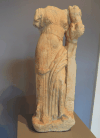
Aphrodite holding Eros on her left arm, from Amphipolis, Greece (2nd century BCE). (550k)
From the Eros entry in Wikipedia:
In Greek mythology, Eros is the Greek god of love and sex. His Roman counterpart was Cupid ("desire"). In the earliest account, he is a primordial god, while in later accounts he is described as one of the children of Aphrodite and Ares and, with some of his siblings, was one of the Erotes, a group of winged love gods.
All pictures are © Dr. Günther Eichhorn, unless otherwise noted.
God of love, lust, desire and sex. Primordial god and personification of Love.
At the beginning there was only Chaos, Night, dark Erebus, and deep Tartarus. Earth, the air and heaven had no existence. Firstly, black winged Night laid a germ less egg in the bosom of the infinite deeps of Erebus, and from this, after the revolution of long ages, sprang the graceful Eros with his glittering golden wings, swift as the whirlwinds of the tempest. He mated in deep Tartarus with dark Chaos, winged like himself, and thus hatched forth our race, which was the first to see the light.
In later myths, he was the son of the deities Aphrodite and Ares: it is the Eros of these later myths who is one of the erotes. Eros was depicted as often carrying a lyre or bow and arrow. He was also depicted accompanied by dolphins, flutes, roosters, roses, and torches.
The story tells of the quest for love and trust between Eros and Psyche. Aphrodite was jealous of the beauty of mortal princess Psyche, as men were leaving her altars barren to worship a mere human woman instead, and so she commanded her son Eros, the god of love, to cause Psyche to fall in love with the ugliest creature on earth. But instead, Eros falls in love with Psyche himself and spirits her away to his home. Their fragile peace is ruined by a visit from Psyche's jealous sisters, who cause Psyche to betray the trust of her husband. Wounded, Eros leaves his wife, and Psyche wanders the Earth, looking for her lost love. Eventually, she approaches Aphrodite and asks for her help. Aphrodite imposes a series of difficult tasks on Psyche, which she is able to achieve by means of supernatural assistance.
After successfully completing these tasks, Aphrodite relents and Psyche becomes immortal to live alongside her husband Eros. Together they had a daughter, Voluptas or Hedone (meaning physical pleasure, bliss).
Eros features in two Dionysus-related myths. In the first, Eros made Hymnus, a young shepherd, to fall in love with the beautiful Naiad Nicaea. Nicaea never reciprocated Hymnus' affection, and he in desperation asked her to kill him. She fulfilled his wish, but Eros, disgusted with Nicaea's actions, made Dionysus fall in love with her by hitting him with a love arrow. Nicaea rejected Dionysus, so he filled the spring she used to drink from with wine. Intoxicated, Nicaea lay to rest as Dionysus forced himself on her. Afterwards, she sought to find him seeking revenge, but never found him. In the other, one of Artemis' maiden nymphs Aura boasted of being better than her mistress, due to having a virgin's body, as opposed to Artemis' sensuous and lush figure, thereby bringing into question Artemis' virginity. Artemis, angered, asked Nemesis, the goddess of vengeance and retribution, to avenge her, and Nemesis ordered Eros to make Dionysus fall in love with Aura. The tale then continues in the same manner as Nicaea's myth; Dionysus gets Aura drunk and then rapes her.

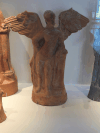
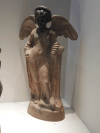
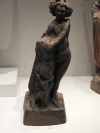
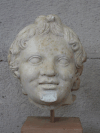
This page contains 5 pictures
Here are the links to the other main pages on Greece:
Page last updated on Fri Aug 19 13:13:42 2022 (Mountain Standard Time)
Eros on soaring.guenther-eichhorn.com